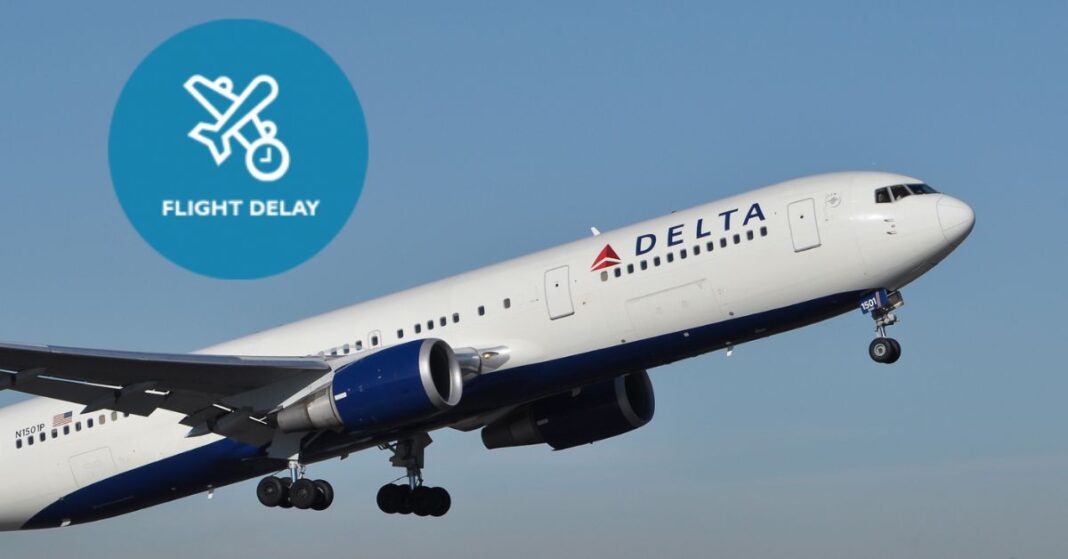Delta Airlines, like any other major airline, sometimes encounters delays that can cause significant inconvenience and financial loss for passengers and businesses alike. The rules surrounding flight delays, as well as the legal rights of the affected passengers, can lead to confusion and even frustration.
Hence, it is essential to comprehend Delta Air Lines‘ specific policies regarding flight delays, as well as the broader legal context for air travel within which these guidelines operate.
Furthermore, it is equally crucial to be aware of the process for seeking compensation for delays and to understand how innovative approaches can minimize the impact of flight disruptions on business productivity and individual convenience.
Table of Contents
Understanding Delta’s Flight Delay Policies
Taking the red-eye or catching a flight for a crucial business meeting, one of the last things anyone wants to grapple with is a flight delay. As a business traveler, understanding the specifics of airline delay policies, like those of Delta Airlines, might just be the silver lining you didn’t know you needed in case of unwelcome surprises.
Delta Airlines is prompt when it comes to addressing flight delays. If Delta should pre-emptively delay your flight by 90 minutes or more for reasons within their control, the airline’s policy is to offer a choice of alternative flights at no extra cost. The alternative may be with Delta or another airline.
But remember, the key here is that the change should be at least 90 minutes. If the delay doesn’t quite reach that threshold, these options may not be offered.
If your Delta flight is delayed in an instance that involves an overnight stay, the Delta Airlines ‘Duty of Care’ policy comes into play. Though the specifics vary, generally Delta handles these cases on a situational basis, and the provision of hotel vouchers, meals, or ground transportation depends on the cause of the delay.
Remember, each situation is unique and Delta will work to provide the best possible outcome for passengers following their policies.
Despite the inconvenience of unforeseen hurdles in air travel, understanding the policies in place can assist in turning a delay into a milestone on your journey, rather than a roadblock. In this high-stakes landscape of business, where every minute counts, it counts to know your rights as a passenger on Delta Airlines.
Legal Rights as a Passenger in Light of Flight Delays
Despite the aforementioned aspects, understanding the passenger rights ascertained by US Federal Aviation Regulations is pivotal. In instances of excessive delay on the tarmac, the Department of Transportation (DOT) necessitates airlines to allow passengers to disembark if the delay persists for more than three hours on domestic routes or four hours on international flights.
Furthermore, during such extended delays, airlines are obligated to provide basics like water, food, clean restrooms, and any necessary medical attention, ensuring passenger well-being remains uncompromised.
Intricacies of the airline’s voucher policy often partnered with delays, also demand close attention from travelers. On Delta Airlines, when the delay is over two hours or spans the mealtime, the airline may provide meal vouchers.
Additionally, they offer passengers travel vouchers or miles, depending on the individual’s SkyMiles membership status, for future use when flights are considerably delayed or canceled. It’s noteworthy that their policy specifies these amenities do not constitute the airline’s “Duty of Care” but a cordial offer.
Delta also abides by the EU regulation 261/2004, applicable if your flight departs from a European Union airport or you’re on an airline based in the EU and your flight arrives at an EU airport. This provision allows passengers on significantly delayed flights to receive up to 600 Euros in compensation, depending on the distance of the flight and the length of the delay.
Claiming Compensation for Delta Flight Delays
Efficiently navigating the process for claiming compensation from Delta Airlines for flight delays is both a game of strategy and understanding of the related rules and regulations.
While passenger rights, as stipulated by US Federal Aviation Regulations and Delta’s readiness to adhere to EU regulation 261/2004, provide significant layers of protection, knowing how to wield this knowledge to one’s advantage is vital.
An essential part of claiming compensation involves communication. Do not shy away from voicing your plight directly to the airline staff. Remember, they have been trained to handle all sorts of passenger grievance scenarios.
Make sure you’ve got your particulars ready: your name, passport details, relationship to Delta (SkyMiles membership number if available), and of course, the specifics of your flight delay. Highlighting your business travel status may elevate the urgency of your situation too. But remember, politeness can go a long way in facilitating good outcomes.
Lastly, familiarizing oneself with the strategies of utilization of vouchers and miles can open up opportunities for maximum benefits. Many business-savvy travelers view dealing with flight delays as a chess game, positioning themselves expertly to leverage maximum returns using passenger rights.
The key is understanding Delta’s meal and travel vouchers/miles policies for delayed or canceled flights, and mindfully applying them to gain the upper hand in an otherwise aggravating situation.
Remember, the key to claiming compensation is a mixture of knowledge, meticulousness, and most importantly, strategic negotiation. Employ these tools to transform flight disruptions into opportunities for unexpected bonuses.
Does Delta Air Lines compensate for delayed flights?
Delta typically does not offer compensation for domestic flight delays lasting less than 3 hours. However, if the delay extends beyond this timeframe due to factors within Delta’s control, such as crew issues or mechanical problems, passengers may become eligible for potential compensation. This compensation could include reimbursements for reasonable expenses, vouchers, or SkyMiles.
It’s important to note that delays caused by weather, air traffic issues, or Acts of God are generally not eligible for compensation.
How long does a flight have to be delayed for compensation?
In the case of domestic US flights, delays lasting less than 3 hours usually do not entitle passengers to compensation from the airline. However, it’s worth exploring whether travel insurance may provide coverage in such situations. On the international front, EU Regulation 261 comes into play for delays of 3 hours or more, offering fixed payouts based on the distance traveled.
If the delay extends to 5 hours or more, passengers have the option to choose between a refund or rebooking. It is crucial to review the specifics of your flight and insurance coverage to understand your precise rights in the event of a delayed flight.
What is Delta policy for missed flight due to delay?
Whether you miss a Delta connection due to a delay depends on your ticket type. For a single ticket, Delta automatically rebooks you for free, even on other airlines, and makes an effort to reunite you with your luggage. Significant delays might also result in a refund or travel voucher.
However, if you have separate tickets, Delta is not obligated to assist, and the responsibility of finding a new flight falls on you. Regardless of your ticket type, it’s crucial to inform Delta promptly if you anticipate missing a connection, as they may still assist in finding new options. For specific details about your situation, feel free to contact Delta directly.





